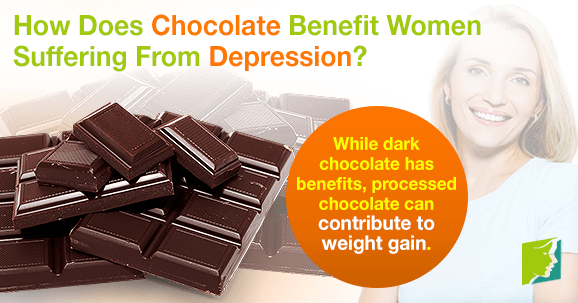It's rich, sweet, and in moderation, good for you. Chocolate has an established reputation as a good to mood-lifter, but can it really treat serious menopausal depression? Read on to learn about chocolate's components and how they affect the brains changes during menopause.

How Chocolate Works
How exactly does this delicious treat boost your mood? Technically speaking, it's the cacao chocolate derives from that works on the chemicals of the brain. The amount of cacao usually ranges from 30 to 80%, with the products that contain higher percentages possessing a more bitter taste and greater health benefit.
Read on to discover the chemical breakdown of chocolate's most potent ingredients and how each one affects your mood.
Dopamine and serotonin
These chemicals both have several benefits, including the ability to promote sleep and reduce the intensity of physical pain. In addition, they are known to increase feelings of happiness. Cacao contains both of these compounds and its effectiveness is thought to consequently derive from its ability to stimulate the brain's production of serotonin and dopamine.
Phenylethylamine
This chemical facilitates the release of endorphins, natural painkillers produced by the brain.
Monoamine oxidase inhibitors
These natural antidepressants slow the breakdown of dopamine and serotonin compounds so that your “chocolate high” lasts longer.
The Catch
In order to reap the health benefits of chocolate, you have to be selective in your treat choices. Milk and white chocolates do not possess the same health benefits as dark varieties because their higher sugar and fat content can result in energy crashes shortly after eating them. Milk is also known to contain compounds that inhibit the antioxidants found in cacao. This means that eating milk chocolate or drinking milk with chocolate subsequently reduces its benefits.
Always be mindful of how much chocolate you are consuming per day. According to The Nestle Research Center in Switzerland, eating dark chocolate in moderation (about 1.4 ounces daily) helps reduce the amount of the stress hormone cortisol in the body. However, too much chocolate can worsen the symptoms of depression and cause weight gain.
More Information about Depression
Depression during menopause can also be treated by exercising regularly, eating a healthy diet, and practicing relaxation techniques such as yoga.
Sources
- Boyles, Salynn, and Dr. Louise Change.(n.d)."Nearing Menopause? Depression a Risk". Retrieved from www.webmd.com
- University Health Services.(n.d)."Clinical Depression".Retrieved from www.uhs.berkeley.edu
- University of Michigan Depression Center.(n.d)."Women and Depression: Menopause". Retrieved from www.med.umich.edu.



